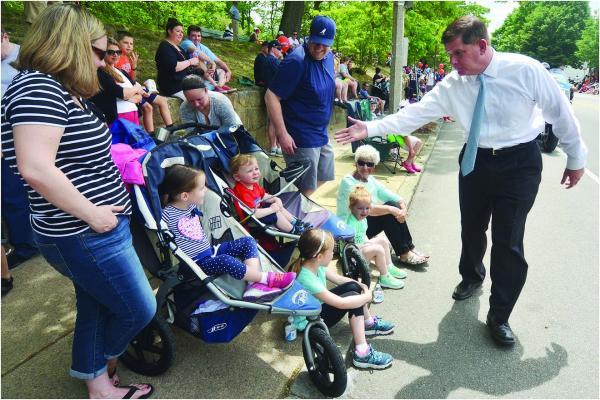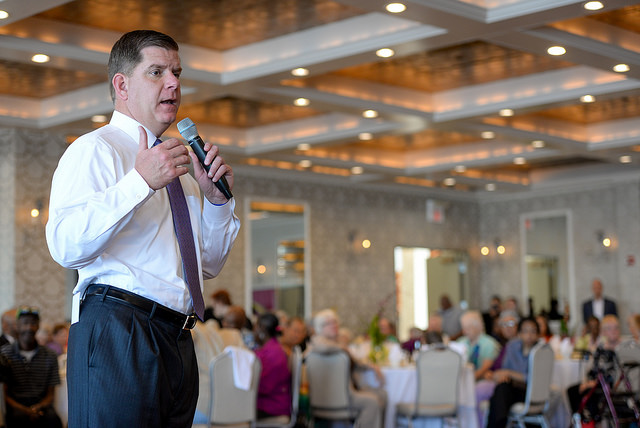June 14, 2017

Mayor Martin Walsh worked the crowd in Lower Mills at the Dorchester Day Parade on June 4, 2017. Chris Lovett photo
Mayor Martin Walsh says he’s not about to forget his roots. The Dorchester native, a former representative and civic leader, now the mayor of a city where no challenger has unseated an incumbent since 1949, is competing in what is generally considered an unbalanced two-man race against City Councillor Tito Jackson.
The first-term mayor sat down last week in the Reporter offices, two floors above his campaign headquarters in the Corcoran-Jennison office building on Columbia Point, for an interview about his campaign, his priorities for the city, and how he sees the tumultuous national conversation impacting Boston’s interests.
Related: Walsh says city must 'be ready to act' as development booms
Two other candidates, James Wiley and Robert Cappucci, have gathered enough signatures to make the ballot, but they face an uphill battle when it comes to overcoming name recognition and financing. In financing, at least, Walsh dominates all challengers with a $4 million war chest.
For all that, the race is hardly a foregone conclusion, Walsh said. “Listen, do I feel good about where I am today? Absolutely. I feel good because of the record, I feel good because of accomplishment, but I would never take anything for granted.”
Comfortable margins in Dorchester, South Boston, Mattapan, Roxbury, Hyde Park, and East Boston carried him to victory in 2013, he said. “Those areas I’ll never forget for putting me in this seat, and I’m fighting for every single vote in those areas, and I want to win those areas, and I want to win them good and big, and I want to let people know that I haven’t forgotten those neighborhoods.”
He added, “I don’t want to win this race by losing Roxbury and winning Beacon Hill. A win’s a win, obviously, but I want to win Roxbury, I want to win Mattapan, I want to win those areas that I won before. I want people to feel like they didn‘t make a mistake when they voted for me in 2013.”
Walsh said he believes he has been successful in pushing out his message. “I feel comfortable where I am. I’m not gonna run away from my record,” he said, pointing to educational investments – the BuildBPS master plan will guide $1 billion of infrastructure improvements into schools over the next decade – and housing initiatives, particularly in areas of homelessness.
The city is housing 1,126 chronically homeless people in apartments, he said, 800 of them chronically homeless veterans. The system in place now, Walsh said, ensures that a homeless veteran who comes to the city for assistance will be in an apartment within six months. The prospect of ending chronic homelessness in the city by 2018 is now looking like “an obtainable goal,” he said.
The mayor said he wishes the city “were a little further ahead” on the public schools, which, he said, was pushed back during a search to fill the superintendent seat now occupied by Tommy Chang.
With housing as well, he said, “It’s difficult be ahead there because it’s a generational lack of building affordable housing. This is something we‘ve only been doing for three years, that over the last bunch of years we haven’t really seen the growth in the city that we’re experiencing now.”
Walsh readily acknowledged the validity of the critique that a lot needs to be done to deal better with crime in the city.
“You know, last night [June 7] we had five shootings, so, even though we talk about being safe, we still have too many shootings,” he said. “We have too many homicides. We have 16 homicides this year so far, same as this time last year, which is you look at it compared to other cities in America. We’re low, but that’s still 16 homicides; 16 people lost their lives. So we can always continue to improve, [me] as a mayor, and as an administration.”
Since the interview, two more fatal shootings occurred in the city, both in Mattapan over a two-night stretch.
 Mayor Walsh at LGBT Senior Event in Dorchester last week: 'As a city, we're gonna try. Why shouldn't we try things?'
Mayor Walsh at LGBT Senior Event in Dorchester last week: 'As a city, we're gonna try. Why shouldn't we try things?'
Walsh’s showpiece initiatives have proved to be a mixed bag. He angled for major projects like bringing General Electric‘s headquarters to Boston, and he has pushed against those who would stop the Winthrop Square garage sale, the proceeds of which he wants to redistribute into outlying and underserved neighborhoods.
And he has not shied away from pursuing some large initiatives that were ultimately unsuccessful.
“Yeah, people will criticize me on some of the other things -- the Olympics and IndyCar,” he said. “I mean, we tried things. It didn’t happen. As a city, we’re gonna try. Why shouldn’t we try things?”
The impact of national affairs on Boston policy has been more and more a factor of late, with President Trump’s proposed budget and stated positions on climate change and immigration giving city leaders serious pause.
Walsh referenced a story published in the Boston Herald, in which reporter Jordan Frias quoted residents asking the mayor to focus more on “local” issues like parking and crime, rather than climate change. The suggestion in that story that national or global policy does not measurably impact Bostonians rankles the mayor.
“Local? Immigration is local,” he said. “It affects Boston. The Affordable Care Act is local. It affects Boston and Massachusetts. The budget that Trump put out there is local. I mean, all the different cuts that he’s proposing in our city. Climate change is local. A good part of the city of Boston is in potentially dangerous areas with sea level rise and climate change. So that’s all local issues.”
Speaking of local, Walsh, a former president of the Columbia Savin Hill Civic Association, said that “being a civic activist and being in the mayor’s office, you get the appreciation for what happens in the community.
“There’s a lot of different pressures that a civic association has to deal with,” he said, “and it’s all volunteer. So I think it’s given me an understanding that the dynamics in a community can be tricky sometimes, but you have to understand that the people who show up at that meeting, most of those are the people who are die-hards for the community.”
Civics groups are not always representative of the whole community, he said, but they still serve as the place where the most engaged community members dissect the day-by-day neighborhood changes. “It’s the quality of life stuff that nobody talks about.” he said.
The Boston Planning & Development Agency (BPDA), formerly known as the Boston Redevelopment Authority, is rightly taking a cue from their historically poor reputation among neighborhoods and increasing neighborhood outreach well before a project is on the table, the mayor noted. The BPDA is a relatively new fixture in Dorchester, he said, with the exception of master planning processes.
“As a rep, I used to get kind of frustrated by watching development and growth happen all around Dorchester, and for years I felt we got dumped on a bit. The whole north-south Dorchester debate…. And we’ve watched areas change, in a positive way, and some people say in a negative way.”
The impression of development in South Boston, for instance, has been polarizing, he said. “But we haven’t see that [in Dorchester] for a long time, then overnight you start to see newer people coming into the neighborhoods. You see new restaurants… and now you‘re starting to see that bigger shift happening and people are starting to invest in our neighborhoods. And I’m happy to see it as a Dorchester resident, but I also want to be careful that the shift isn’t so dramatic that we lose the longtime families that are here.”
Just last Sunday, Walsh marched along Dorchester Avenue for the annual Dorchester Day parade and pondered the changed face of Dorchester. He recalled that about two decades ago, mostly old Dorchester families lined the streets, a time that was followed by 15 years of “kind of a sad walk.”
Of late, Walsh said, there has been another change, and for the better. “It was a pretty well attended parade this year, and the faces were pretty diverse, a mix of a lot of different people,” he said. “So it was nice to see that Dorchester is continuing the diversity of our neighborhoods and seeing that people were actually coming out to watch the parade. I was excited to see that.”
Topics:


